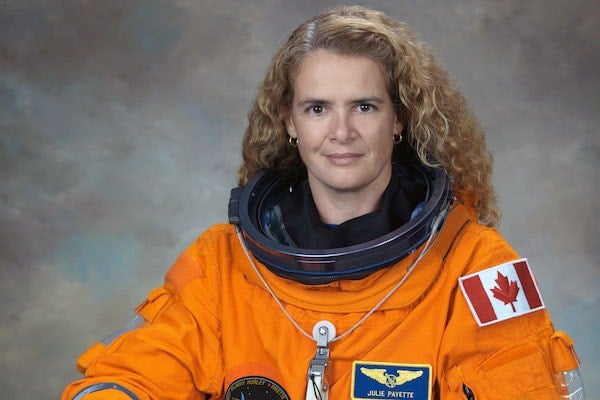
Astronaut Julie Payette on the Toronto Science Festival
Published: August 26, 2013
From September 27th to the 29th, the University of Toronto is presenting the first annual Toronto Science Festival, a three-day celebration of science that explores the theme of Life in the Universe. (Read more about the festival.)
On Friday, September 27th, the festival opens with alumna and Canadian astronaut Julie Payette delivering the keynote address.
Payette has flown aboard the Space Shuttles Discovery and Endeavour and worked onboard the International Space Station twice. Over the course of two missions, she has spent more than 25 days in Earth orbit and traveled over 16 million kilometres.
Born in Montreal, Payette received a Master of Applied Science, Computer Engineering, from U of T. She became the COO of the Montréal Science Centre in July 2013.
The Toronto Science Festival is about celebrating science. Why is this important to you?
Today, ours is a scientific and technological society, so having knowledge of science and technology is as fundamental as knowing how to read, write and count. We all need to know the fundamentals so that we can function well in society, contribute to it, and help solve today’s problems. And so having access to science is critical—through science centres, museums, universities, and through events like the festival.
Does your experience as an astronaut continue to inspire your work?
Part of being an astronaut is sharing the privilege of being in space and seeing the Earth from above. So I do a lot of work in raising awareness of our planet. And today, I do a lot of work with ArcticNet, a Networks of Centres of Excellence in Canada, at Université Laval, a consortium of 120 researchers studying the Arctic.
With the Earth warming and the Arctic warming faster than the rest of the globe, we will see great changes in the north. There is a huge potential for development in the Arctic and how we develop the region is critical. The consortium has been gathering data for a long time, and is very proactive in advising policy makers. Because without good data, you can’t make good decisions.
As one of the few humans to explore beyond our planet, what do you envision for the future of human exploration of space?
In our lifetime, we’ll see people return to the Moon; we will see people go to Mars. But the Universe is immense. The star closest to our Sun is just over four light-years away. If we traveled as fast as possible using today’s technology, it would take us some 400,000 years to get there. So you and I probably won’t see people go to another star—unless we discover something fundamentally new about the physics of our current means of travel.
The festival’s theme of Life in the Universe includes extraterrestrial life. What are your thoughts on SETI, the Search for Extraterrestrial Intelligence?
What are the chances that somewhere out there, there are other forms of life? Probably good. What are the chances of detecting that life? I think, quite minute. But I think it’s very worth looking and I know we have astronomers at the U of T that are part of that search.
And it’s very presumptuous to think that we are alone, that we are “it.” Five hundred years ago, we thought we were the centre of the Universe and that everything revolved around us. We thought we were the absolute centre of the Universe, and today we know absolutely that we are not.
You spent three years at U of T. Are you looking forward to returning to the university and to Toronto?
I’m always very delighted to return to the city and the university. I had a very good experience in Toronto. I was very privileged because I was a Junior Fellow at Massey College. I sang with Tafelmusik Baroque Orchestra during my three years there. It was just a very, very good experience and I’m looking forward to the festival in September.
Chris Sasaki is a writer with U of T's Dunlap Institute for Astronomy & Astrophysics.



